Often when guinea pig owners see certain signs like watery eyes, red skin, sneezing or discharge from the nose, etc. they suspect their guinea pig is suffering from certain kinds of allergies. But how true is it? Do guinea pigs have allergies to certain things? Let’s find out!
Guinea pigs can get allergic to a certain kind of food ingredients, cleaning products, strong scent, fumes, mites, and fleas. Some guinea pig owners also compliant that their guinea pig is allergic to hay, but the actual culprit is the dust in the hay.
Much like humans, guinea pigs are sensitive to certain kinds of food ingredients & common environmental allergens.
Most guinea pig owners often do not understand the cause behind those apparent symptoms, and they believe that nothing is wrong with their guinea pigs.
However, in most cases, it is the case of poor diagnostic and lack of proper information.
If guinea pigs are exposed to specific allergens for a prolonged period, then they may suffer from serious health issues, including Upper Respiratory Tract Illness(UTI), Rhinitis, and Bronchitis.
Thus, it is crucial to understand some common causes of guinea pig allergies and take necessary actions to prevent those allergies in your guinea pigs.
It is also advised to visit an Exotic & Experienced vet if your guinea pigs show specific symptoms for a long time.
Types of guinea pig allergies
We provide you with such information to better understand your guinea pigs. Under no circumstances, the information should be treated as medical advice.
You should visit a professional Vet immediately if your guinea pigs show any signs of distress.
| Types of guinea pig allergy | Causes | Signs |
|---|---|---|
| Dust allergy | Dust in the hay, Certain kind of bedding, etc. | Sneezing, Itchy & Red eyes. |
| Food allergy | Certain ingredients in food like seeds, nuts, oil, rice bran, ground Corn, etc. | Change in skin, rashes and labored breathing. |
| Environmental allergen | Household chemicals, strong smell, fumes, mites & fleas. | Sneezing, labored breathing, red and itchy eyes. |
| Bedding allergy | Soiled bedding, Derbies buildup | Sneezing, Red, Itchy & watery eyes. |
| Allergic conjunctivitis | Exposure to the environmental allergen for a long period | Red & inflamed eyes, Discharge from eyes. |
When it comes to diseases and allergies, guinea pigs are resilient pets. But certain factors can lead to allergies in guinea pigs.
Some of the most common types of allergies that most guinea pigs suffer from include allergy from dust in the hay, dust in bedding, and particular environmental allergy.
Environmental allergies are mostly caused by household items used around your guinea pigs or some fumes and smoke around their cage, etc.
Food allergy can also occur in rare scenarios if you don’t choose the right vegetable and pellets for your guinea pigs.
Now, let us learn more about all the different types of allergies in detail.
Guinea Pig Food Allergies
Food allergies are another common type of allergies found in guinea pigs. The primary symptoms of food allergies are irritation in skin & change in stool.
Identifying the cause of food allergy can be a daunting process for most guinea pig owners.
In most cases, the guinea pig owners are unaware of the diet and environment their guinea pigs have come from.
Also, different guinea pigs can react differently to the same type of food.
It is similar to human beings, as one human being can be allergic to peanuts while others can eat it with no problem at all. The same applies to guinea pigs as well.
What foods are guinea pigs allergic to?

Your guinea pigs can be allergic to a wide variety of food. They can be allergic to vegetables, fruits, plants, pellets to hay.
Sometimes certain ingredients in the diet can also trigger an allergic reaction in guinea pigs.
You must lookout for signs of food allergies and use an elimination method to pick the right food out of the list.
Can guinea pigs be allergic to hay?
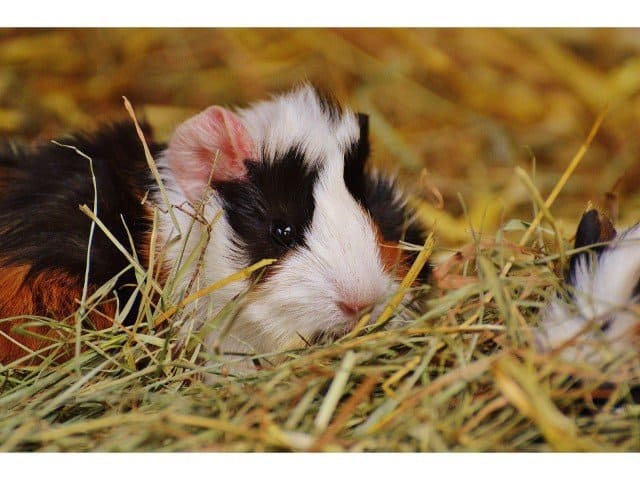
No, guinea pigs are not allergic to hay. However, sometimes hay comes with a lot of dust in it, and that can cause an allergic reaction in guinea pigs.
If your guinea pigs show some apparent signs like sneezing, watery eyes, etc. just after serving hay to them, then you should be suspicious towards the hay.
However, hay consists of 80% of your guinea pig’s diet, and there is no way we can eliminate hay from our guinea pig’s diet.
The dust in the hay causes most of the allergic reaction to hay, and that is what we must focus our attention on.
Different types of hay come with a different level of moisture and from different yields. These are the primary factor that affects the amount of dust hay produces when being handled.
How to deal with hay allergy in guinea pigs?
If you have recently got a new bag of hay and you notice specific allergies symptoms in your guinea pigs, then there are a few ways to deal with it without wasting the hay.
- Pull out a pile of hay and put it in a storage container. Now you can carry the box to somewhere like your sink and fluff up the hay a little bit to get rid of extra dust. Now place the hay back into the cage.
- You can use a nylon hay feeder pouch. It helps by containing all the hay, and thus less of dust gets spread around your guinea pigs.
- Lightly mist the hay with a spray bottle to keep the dust level low.
- Lastly, you might need to switch to a different brand or quality of hay. I personally love Oxbow or Smallpetselect Hay; they tend to be the least dusty and of premium quality.
- You can also try orchard hay as they tend to be less dusty as compared to timothy hay. Orchard hay has similar nutritional value as timothy hay.
Please note: Any change you make might take a few days to reflect on your guinea pig’s health and behavior.
Can guinea pigs be allergic to pellets?
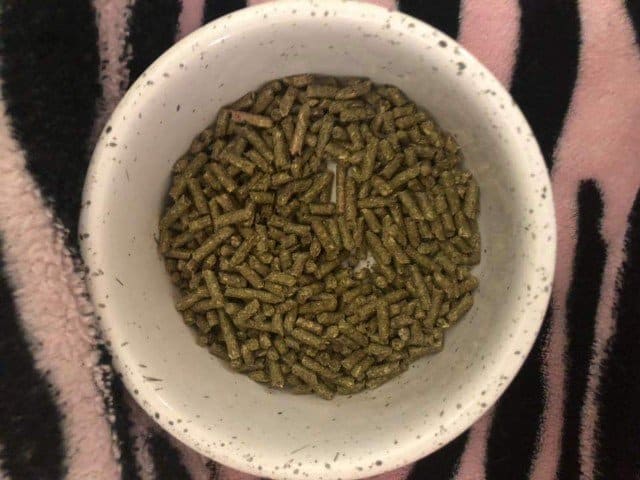
Yes, guinea pigs can be allergic to pellets sometimes; however, in most cases, that is due to the fault of the owner itself.
Most guinea pig owners don’t have access to quality information; thus, they are unaware of the fact that not all guinea pig pellets are safe for guinea pigs.
Yes, it is a sad truth that guinea pig is not as popular as mainstream pets like dogs and cats. Thus, a lot of products for them are of substandard quality, or they tend to mix certain ingredients that are not safe for our guinea pigs.
For example, certain elements in guinea pig food pellets like seeds, nuts, oil, rice bran, ground Corn, etc. can be terrible for our guinea pigs, and most of the pellets available in the market contain these sort of ingredients.
Sometimes a guinea pig can also be allergic to a particular brand of pellets that includes some elements that don’t suit your guinea pigs.
In either case, you don’t have much choice. It would be best if you got a new pellet for your guinea pigs.
Also, be careful while getting pellets as you don’t want the ingredients, as mentioned earlier, in high quantities in your guinea pig’s food.
Signs of food allergies in guinea pigs
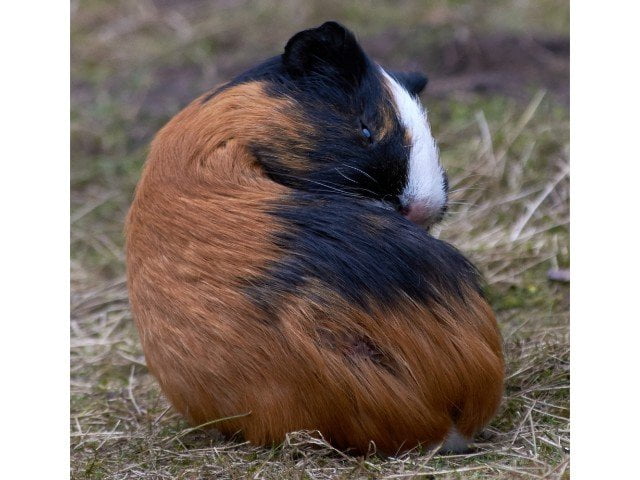
There are various signs of food allergies in guinea pigs. However, it can be tough for a guinea pig owner to differentiate between the signs of allergies and other common health issues in guinea pigs.
Still here are a few symptoms you must look out for:
- Itchy skin
- Scratching their ear
- Hairloss or patches in the fur
- Diarrhea
- Bloating
- Improper diet and water intake
Since hair loss or patches in the skin can take a few weeks to appear, you must look out for other signs to begin with.
However, if your guinea pig is already showing a sign of hair loss, you must immediately visit the vet as it means they have been suffering from some kind of health or allergy issue for a prolonged period now.
Causes of food allergies in guinea pigs
| Types of food | Causes of allergies |
|---|---|
| Hay | Due to dust in hay |
| Pellets | Certain ingredient in pellets like seeds, nuts, oil, rice bran, ground corn, etc |
| Vegetable | Certain types of greens can lead to diarrhea and bloating in guinea pigs. |
| Fruits | Certain kinds of fruits can lead to mouth sore and diarrhea as well. |
How to manage food allergies in guinea pigs
The only method to find out what food is causing allergy in your guinea pigs you must follow the elimination method.
There are no medical tests that your vet can perform to confirm the allergy. Start by looking at the current diet of your guinea pigs.
Did you introduce a new food in the past few weeks that is causing allergies recently? If you have just brought your new guinea pig home, you must ask the previous owners regarding their past diet and start with the same.
Try to eliminate any newly added vegetable, fruit, or pellets to begin with. Watch the symptoms closely for a week or two.
If your guinea pig shows a sign of relief, then you have got the problem solved. Else ask the vet to suggest a well-balanced diet and then slowly transitioning towards that.
You might see some signs of relief while transitioning, and if not, you can follow the vet prescribed diet and then slowly add a new food at a time to find the food that is the culprit behind all this.
I know it can be a long and time-consuming process, but there is nothing more we can do about it.
Are guinea pigs allergic to anything?
Yes, guinea pigs can be allergic to a lot of things around their living area. There is also a variety of environmental factors that can lead to allergy in guinea pigs.
Common causes of allergies in guinea pigs
Some of the most common household items or environmental allergen in guinea pigs include:
- The scent of detergent or any cleaning product
- Air fresheners, body sprays, and perfumes
- Essential oils or diffusers
- Scented Parrafin Wax candles
- A strong smell of cedarwood used in building
- The smell of certain flowers
- Dust
- Kitchen fumes
- Cigarette smoke
- Fireplace or Wood burner fumes
- fleas and mites
These are some of the most common guinea pig allergens found in a household.
Just like human beings, there can be many other factors or allergens that can lead to an allergic reaction in guinea pigs.
Signs of irritation in guinea pigs
Some of the obvious signs of irritations in guinea pigs are as follows:
- Red and water eyes
- Sneezing
- Discharge from nose
- Scratching the skin
If your guinea pigs show any of the above sign then you must look out for the cause and make sure you eliminate the same.
How to prevent irritation in guinea pigs?
Preventing the irritation in the first place is a wise move to make. Guinea pig’s health can go from good to worse in a matter of a day.
Prolonged exposure to allergens or irritants can lead to serious health problems, including Upper Respiratory Tract Illness(UTI), other respiratory infections, including rhinitis and bronchitis in guinea pigs.
Thus, make sure you avoid using these irritants and household products around your guinea pigs.
Some of the best practices to follow are:
- Ensure proper ventilation in the area you house your guinea pigs.
- Use a fan or air vents for the circulation of air around the room.
- Install a HEPA filter around the cage. (I personally use Levoit Air Purifier)
- Use a natural floor & room cleaner to clean the room.
- Clean your guinea pigs cage regularly.
- Use some mild and natural cleaning products, such as vinegar and baking soda.
- Clean your air ducts and cover regularly to remove dust.
- Use scentless detergents for washing fleece or any of your guinea pig supplies like hideouts, etc.
Guinea pig allergic to bedding
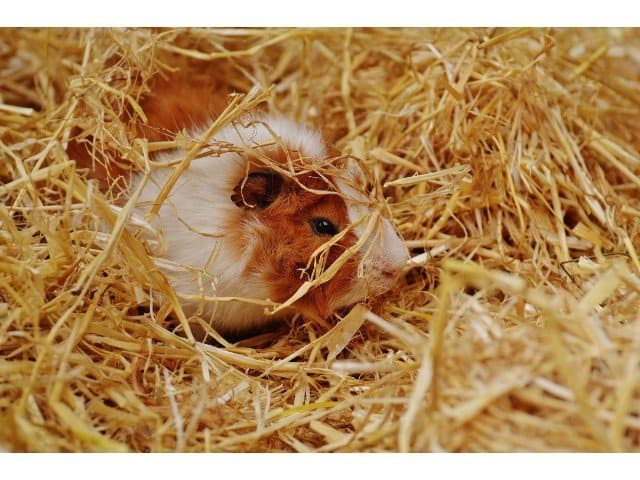
Bedding allergy is another most common type of allergy in guinea pigs. Most of the time, bedding allergy is due to the improper living environment.
You need to make sure you spot clean your guinea pigs cage daily and deep clean their cage once a week.
You might need to change or wash the bedding as per the debris buildup in the cage. Most guinea pig beddings must be changed in 7-10 days without fail to avoid allergies in guinea pigs.
Soiled bedding often causes ammonia buildup due to stool and poop lying around the cage.
The ammonia buildup can cause respiratory problems and other health issues in guinea pigs.
Thus, make sure you keep the bedding clean and change it whenever needed.
I personally prefer Guineadad fleece liners as their beddings are superabsorbent and odor-free. They are easy to clean and reusable as well.
Can guinea pigs be allergic to pine bedding?
Yes, guinea pigs can be allergic to pine bedding for sure. Pine bedding has some strong smell that can be irritating to the respiratory system of your guinea pigs.
In some cases, the use of pine bedding has also lead to some chronic skin problems in guinea pigs.
Thus, make sure you avoid using pine shaving in your guinea pigs cage.
Although not all guinea pigs have a problem with pine shaving; however, with lots of better bedding options available in the market, it is best to avoid using it entirely.
Can guinea pigs be allergic to aspen bedding?
Yes, guinea pigs can be allergic to aspen bedding as well.
However, aspen bedding allergy is not as common in guinea pigs as compared to pine bedding, but still, there can be some rare instances where your guinea pig can be allergic to aspen beddings as well.
Some common types of guinea pig allergic reactions
Allergic reactions in guinea pigs can lead to a wide variety of diseases in them. Some of the most common types of health issues caused by an allergic reaction in guinea pigs are:
- Rhinitis or Sinusitis
- Conjunctivitis
- Asthma
- Pasteurella
- Eczema
Rhinitis or Sinusitis
Allergic Rhinitis or Sinusitis are some of the most common health issues in guinea pigs caused by an allergic reaction in them.
Both of these are respiratory diseases that can cause nasal discharge and excessive sneezing in guinea pigs.
Rhinitis is an inflammation of the nasal membrane, and sinusitis is the inflammation of the air-filled spaces surrounding of the sinus cavity of your guinea pigs
Both Rhinitis or Sinusitis can either be infectious or non-infectious in nature.
While the Non-infectious Rhinitis or Sinusitis is caused by some environmental allergen, including strong smell, dust, fumes, etc. a bacterial or viral infection mostly causes the infectious ones.
Conjunctivitis
Conjunctivitis is another common health issue that is caused by an allergic reaction in guinea pigs.
Although various other factors can lead to Conjunctivitis in guinea pigs, hay & bedding allergy are one of the most common ones.
Some of the most common symptoms of Conjunctivitis in guinea pigs include Red, water & itchy eyes.
It would be best if you visited a vet to make sure whether it is an allergic reaction causing Conjunctivitis in guinea pigs or some other bacterial infection.
Your vet may prescribe some medicine and treatment according to the cause discovered.
Asthma
Asthma is another major illness in guinea pigs that can be caused by prolonged exposure of particular allergen in guinea pigs.
It is a respiratory problem that can lead to difficulty breathing and other health issues if not treated on time.
Thus, make sure you visit a vet to determine the cause of asthma and treat the same accordingly.
Eczema
Eczema is another common health issue caused by an allergic reaction to bedding.
Some of the common signs of eczema in guinea pigs include red and crusty skin, guinea pigs constantly scratching their surface, followed by patches and rashes in the skin.
It has been researched that such an allergic reaction can be caused due to the use of pine or cedar bedding in your guinea pig’s cage.
There can be some other factors that can lead to eczema in guinea pigs as well.
Sources: Care of Guinea Pigs, Rhinitis or Sinusitis, Allergic conjunctivitis in guinea pigs, Asthma in guinea pigs, Allergic Contact Dermatitis in the Guinea Pig.
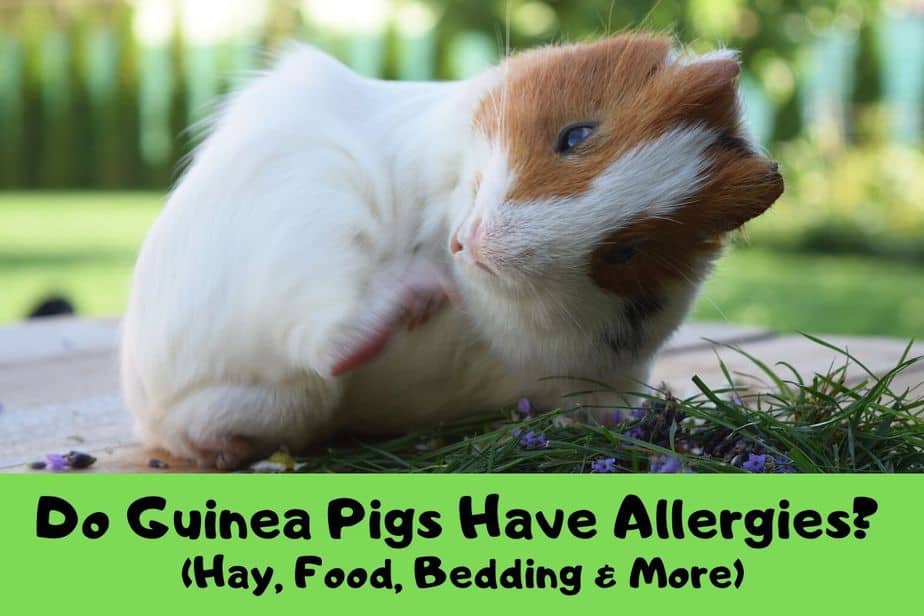
Chloe
Friday 6th of October 2023
Hello, i'm not sure if this is the place to ask questions. I was just wondering if it is possible for guinea pigs to be allergic to pollen. One of my guinea pigs seem to only sneeze a lot and get a white and milky discharge from her eyes, during the spring and summer. It usually goes away just as Autumn hits. I was also wondering if there is any medicine that I could get her and if this is a cause for concern. Could there be anything else that she may be allergic to?